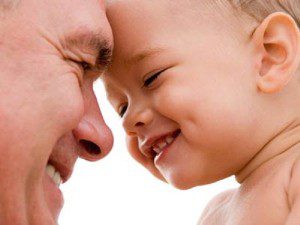Four Out of Ten Babies Born in the U.S. Do Not Form a Strong Bond
With Either Parent
New studies confirm that four out of ten babies born in the U.S. do not form a strong bond with either parent. In the late 70s, there was an upsurge of interest in birth and bonding, with parents choosing home births, rooming-in at hospital births, and learning Infant Massage and other things that brought parents and infants together. But unfortunately, that progress has decreased as time went on, in spite of the upsurge of programs like Infant Massage.
According to a study at Princeton University, 40 percent of infants in the U.S. live in fear or distrust of their parents, and that translates into aggressiveness, defiance and hyperactivity as they grow into adults. Of that number, 25 percent don’t bond with their parents because the parents aren’t responding to their needs. A tragic 14 percent find their parents so distressing that they avoid them whenever possible.
Sociologist Sophie Moullin of Princeton, lead author of the study, along with coauthors from Columbia University, analyzed more than 100 research projects, including data collected by a U.S. longitudinal study of 14,000 children born in 2001, to reach their conclusions. Yet critical, bonding, the researchers contend, is amazingly simple to achieve. The study notes, “When a parent res犀利士
ponds to a child in a warm, sensitive and responsive way — picking up the child when he cries, and holding and reassuring him — the child feels secure that they can meet their needs.”
Incredibly, four out of ten infants born in the U.S. do not form a strong bond with either parent and, according to the authors of an article on the subject, “they will pay for that the rest of their lives.”
Other research shows that simply touching, or caressing a newborn is critical to the infant’s sense of security. Infant Massage, therefore, becomes an incredibly important art for parents to learn. Our instructors need to influence parents more than ever.
Usually it is the mother who is the central focus of studies like these, probably because the mother is often the main caregiver, especially in infancy. But a study at the University of Iowa two years ago concluded that “being attached to dad is just as helpful as being close to mom.” A similar study in 2012 from the Imperial College London found that fathers were especially important in helping the infant avoid behavioral problems later in life. If the father is remote or distracted, the child is more likely to be aggressive.
If a failed relationship is detected, especially when the infant is six months old or younger, the chances of helping the parent and child form a strong bond is greatly improved.The fact that damage can begin that young should be sobering to parents, but as is so often the case, the parents most in need of help are often the least likely to seek it.
What these studies show is the importance of those first few months of life, when a tiny baby is sent on a trajectory that will partly determine success at something as simple — and critical — as getting along with others. Other research shows that simply touching, or caressing, a newborn is critical to the infant’s sense of security.
As Infant Massage Instructors, it is crucial that we find more ways of reaching parents of newborns, especially families who have the powerful factor of poverty. For instance, boys growing up in poverty are more than twice as likely to have behavioral problems in school if they did not have a strong bond with a parent. Babies without a strong bond with parents will have difficulty living a successful and fulfilling life.
In another article about these studies, Lauren Jimeson says, “These studies prove that those first few months of your child’s life, when life can be overwhelming and it can be a major adjustment for everyone, are the most critical. It’s important that both parents take the time that they need to really focus on being a parent and showing that immense love to your child. Hold them, cuddle them, rock them to sleep, do whatever you can that makes life happy for you and your baby. It’s this love that will help shape your child’s life forever.”
— Vimala McClure




